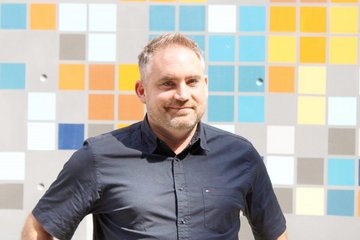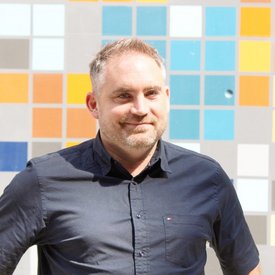OKRs at Scout24: Exciting challenges and meaningful changes
Who are you and what are you doing at Scout24?
Ben: I’m Ben Hogan, I feel like I have the best job in the company because I get to work on some really interesting projects (hence the title VP of Awesome). I work with our CTO Rich Durnall and one of the projects I’m really proud of recently is helping introduce OKRs across the Scout24 Group. I’ve been lucky enough to work with our team of really talented people including our OKR Champions who work in many of our teams to lead and support the OKR process. I also get to work with our awesome Project Management Office lead by the very cool Max Maiuri, and this team now looks after our OKR process overall.
For people new to the topic of Objectives and Key Results: What are OKRs and how do you use them?
Ben: OKRs are simple to explain, but hard to master. It stands for Objectives and Key Results. We use the objective as our easy to remember, catchy slogan, for example “Create an awesome employee experience” and the Key Results are specific, measurable results, for example “Increase satisfaction with internal services from X to Y by the end of 2019”.
We use OKRs at many levels of Scout24, from the team level to the Executive Leadership Team (ELT) OKRs. We set them every four months, in three cycles a year.
Why did Scout24 start with OKRs?
One of the biggest drivers for adoption of OKRs was a sense that we could improve alignment across the organisation, in particular there was a sense of disconnect between the executives and the teams and also between teams. Some of our most challenging projects had been cross-team initiatives spanning multiple departments and functions.
We also had a sense that we could improve our overall impact by increasing the alignment on what was the most important objectives to focus on across the company.
When did we start and how long did it take to get to where we are now today?
Ben: Our Platform Engineering team led by Fred Kraus started using OKRs in early 2017, and in November of that year our CTO wrote the first set of OKR for the overall Tech function. After that our CPO (Chief Product Officer) Thomas Schroeter wrote his first set of product OKRs.
Rich asked me to help introduce OKRs to the rest of the organisation in December 2017 and shortly after I worked with our executive team to create our first set of company level ELT OKRs. This early executive buy-in was a real driver for the adoption over the last 18 months. An early success was moving from separate tech and product “functional OKRs” to a single cross-functional set of OKRs agreed by the ELT.
We broadened the adoption across the builders (product and engineering) organisation and proceeded incrementally by teams.
It took all of 2018 for the rest of the builders organisation, approximately 600 people, to start using OKRs, and at the start of 2019 we added the rest of the organisation including our People, Finance and Legal teams. We now have over 1200 people using OKRs.
What were some of the biggest challenges adopting OKRs and how did we overcome it?
Ben:Before we started with OKRs, most of our 1200 people had never heard of them, especially outside of the tech function. I also had no experience with OKRs and the largest change I had run at that time was for ~300 people, so 1200 felt like a challenge. At first, I was a bit stumped how we could go about implementing such a big change across 100 teams: It was pretty overwhelming.
I think one of the key ways we met this challenge was to create an OKR champions program that recruited volunteers across the organisation and provided a learning and development path including internal and external trainings and an internal community forum. These OKR champions helped support the adoption in their teams.
We also had enthusiastic early adopters and the most significant were our executive team. They provided support and commutations for the program, especially our CEO Tobias Hartmann who spoke about OKRs at our town halls. We also found an excellent local OKR tool vendor to partner with and provide OKR tool support.
How have OKRs impacted Scout24? What are the biggest benefits you have seen so far?
Ben: One of the biggest benefits we’ve seen so far is improved alignment: we see robust debate and engagement between different levels in the organisation, especially on what are the most important objectives for us to focus on. We also have used shared OKRs to create virtual teams that span the organisation structure and allow us to organise ourselves around our OKRs. This has allowed us to quickly bring significant focus to some new strategic product initiatives.
The last few years learning OKRs have been an eye opener for many of us. The biggest shift has been thinking much more about impact and outcomes instead of activities and outputs. This is helping us focus more on what matters and less on what doesn’t.
I think OKRs are a game changer, and I’m excited to see how our OKR journey continues. I think the last two years have just been the beginning of something awesome.
It was a great pleasure for us to meet up and share #OKR experiences with #scaleup leaders from @scaleup_valley, @deliveryherocom, @n26 and @getgrover. ? all for your insights! #WorkingAtScout24pic.twitter.com/BvLEMlq242
— Scout24 (@Scout24) 26. Juni 2019<script async="" src="https://platform.twitter.com/widgets.js" charset="utf-8"></script>

